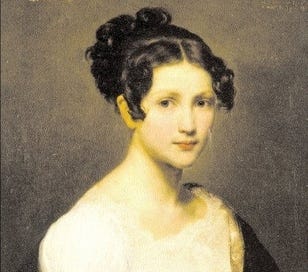SPOILERS ahead: you may want to keep this post for later if you haven’t read Mansfield Park before.
I firmly believe that Jane Austen’s Mansfield Park is a grossly underappreciated novel. I was thrilled when my husband, who had previously read four of Austen’s main novels (he only has Persuasion left now) decided to give it a go. I won’t keep you on your toes: he loved it! Not only that, but he kept pointing out passages to me that had escaped my attention - that’s the danger of writing a lot on a specific text, you can get too comfortable quoting the same sections again and again…
Although I could write a whole essay on my husband’s many insights into Mansfield Park as a first time reader, I’ll limit myself to one particular passage which caught my attention, because it reminds me so much of how Mary Wollstonecraft writes about male chastity. (I’ve written on Wollstonecraft and Austen and the life of the virtues before here, by the way, if you’re interested!). At the end of the novel, the omniscient narrator reflects on the consequences faced by Maria Rushworth (née Bertram) and Henry Crawford as a result of their adulterous relationship. The decline in social status falls disproportionately on Maria:
That punishment, the public punishment of disgrace, should in a just measure attend his share of the offence is, we know, not one of the barriers which society gives to virtue. In this world the penalty is less equal than could be wished; but without presuming to look forward to a juster appointment hereafter, we may fairly consider a man of sense, like Henry Crawford, to be providing for himself no small portion of vexation and regret: vexation that must rise sometimes to self-reproach, and regret to wretchedness, in having so requited hospitality, so injured family peace, so forfeited his best, most estimable, and endeared acquaintance, and so lost the woman whom he had rationally as well as passionately loved.
In other words, Henry Crawford suffers from the knowledge of his wrongdoing in his conscience, as well as from the loss of Fanny Price, but while he may be judged by God after death, as long as he is of this world, he can carry on relatively unscathed. Maria, on the other hand, is ostracised, forced to live with Mrs. Norris in a disgraced state. Although in theory chastity is a Christian virtue for both men and women, in practice female unchastity is punished severely, whereas there is no severe ‘public punishment of disgrace’ which can curb male desire, thus providing a ‘barrier’ aiding ‘virtue’.
Now, most Austen scholars I know would take a passage like this and conclude that is unfair is that Maria suffers from her failure of self-control. ‘She should be allowed to do what she wants!’, I can hear my fellow literary scholars shouting, ‘Austen is lamenting the kind of sexism that elevates female chastity as the only virtue!’. It is a great shame that this is what a lot of contemporary feminists in academia - as well as outside it - fight for: the right for women to be just as badly behaved as men. This kind of attitude also completely blinds us to the insights of people like Austen, who lived a long time before the sexual revolution. Because when you actually read the passage I quoted carefully, it’s clear that what Austen is lamenting is that Henry Crawford is not held as accountable for his sins as he should be. There is nothing wrong with valuing chastity as a virtue, but it should be so for men as well as women.
That is a remarkably Wollstonecraftian conclusion to reach. Although often misunderstood and lumped with later liberal feminists, Wollstonecraft actually cared a lot about virtue. She wanted women to receive a better education so that they could be more virtuous. Sir Thomas Bertram, at the end of Mansfield Park, similarly reflects that his daughter Maria may not have gone astray if, instead of merely learning social graces, she had actually been instructed on how to cultivate a virtuous mind. Wollstonecraft would also agree with Austen where she suggests that Henry Crawford has no incentive to grow in virtue because there are no social consequences to his libertinism. In A Vindication of the Rights of Woman (1792), Wollstonecraft decries the sexual immorality of men and its effects on women’s ability to become virtuous, saying that:
I will venture to assert, that all the causes of female weakness, as well as depravity, which I have already enlarged on, branch out of one grand cause—want of chastity in men.
Now, we can disagree with Wollstonecraft that all female weakness derives from want of male chastity - perhaps that is placing too much of the blame on men and not enough on women. The point remains, that for both Austen and Wollstonecraft chastity is not a gendered virtue, but one common to both men and women as human beings. And even if, like Henry Crawford, society does not openly judge and shame you for your lack of chastity, you will still suffer from ‘self-reproach’. Contemporary liberal feminists, who hail the sexual revolution as the beginning of freedom for women, would do well to heed Austen’s words. Even if we can escape society’s judgement, we cannot escape our own conscience.





Many compliments for this engaging essay, full of highly inspiring ideas.
It is so stimulating that it induces the desire to pick up the volumes cited and start reading them.
Flavio